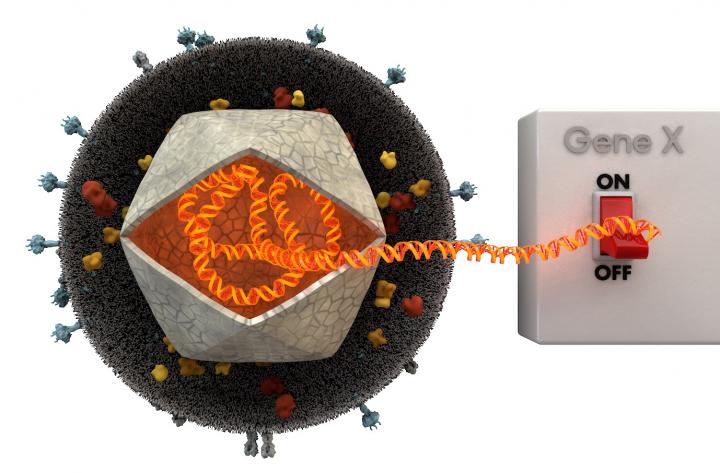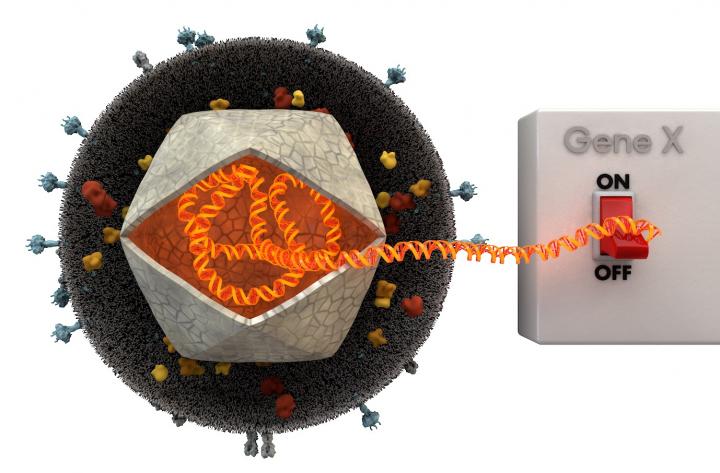
The ability to switch disease-causing genes on and off remains a dream for many physicians, research scientists and patients. Research teams from across the world are busy turning this dream into a reality, incuding a team of researchers from Charité – Universitätsmedizin Berlin and the Max Planck Institute for Medical Research in Heidelberg. Led by Dr. Mazahir T. Hasan, and working under the auspices of the NeuroCure Cluster of Excellence, the team has successfully programmed a virus to transport the necessary genetic material to affected tissue and nerve cells inside the body. A report on their new virus-based method, which delivers instructions to the host genome without becoming part of it, has been published in the journal Molecular Therapy Nucleic Acids*.
From cancer to Alzheimer's disease, many life-threatening diseases can only be treated using drug-based treatment options, if at all. Many of these treatments are non-specific in nature, or even ineffective. In some cases, the undesirable side-effects may even outweigh the desirable ones. This is because indiscriminate treatments damage healthy cells, impairing their ability to communicate with other cells; as a result, it is hoped that genetically produced and modified mediators will be able to selectively target diseased cells, and improve the way treatment is delivered. "In the laboratory, we use attenuated, i.e. non-replicating,viruses that are known as recombinant adeno-associated viruses (rAAV). We use them to transport genetically encoded material into live organisms affected by disease," explains Dr. Hasan. "This approach opens up a whole range of options which, in the future, may allow us to treat and heal various diseases."
By successfully completing the initial step of testing this new method using an animal model, the researchers have laid the groundwork for future genetic treatments for use in humans. Before these can be used, however, they will need to be tested to ensure their safety. It is already known that rAAVs can transport genetically encoded material into any type of cell and tissue, including the brain, and that, once inside the cells, they are capable of repeatedly switching gene therapy applications on and off again. This on/off switch is controlled chemically, via either food intake or drinking water: "The fact that gene function can be switched on and off in this manner is of particular value, and renders the method a perfect candidate for use in controlled gene therapy," emphasizes Dr. Hasan
The fact that rAAV-infected cells do not trigger any form of measurable immune response and that their genetic material remains completely intact represents an additional benefit. While this does not mean that future gene therapy applications are guaranteed to be successful, the researchers are full of confidence for the future. "We are still at the laboratory stage," says Dr. Hasan, adding: "Once additional safety options are in place, this development could spearhead innovation, heralding in a time when the transfer of genetically encoded material will be used to heal severe diseases, including neurological ones such as Parkinson's disease, Alzheimer's disease and epilepsy."
###
*Godwin K Dogbevia, Martin Roβmanith, Rolf Sprengel and Mazahir T Hasan. Flexible, AAV-equipped Genetic Modules for Inducible Control of Gene Expression in Mammalian Brain. Molecular Therapy Nucleic Acids. 2016/ 5, e309. doi:10.1038/mtna.2016.23.
Contact:
Dr. Mazahir T. Hasan
NeuroCure Cluster of Excellence
Charité – Universitätsmedizin Berlin
Tel: 49-30-450-539-175
Email: [email protected]
Link:
NeuroCure http://www.neurocure.de/activities-238.html
Media Contact
Dr. Mazahir T. Hasan
[email protected]
49-304-505-39175
http://www.charite.de





